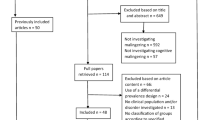Abstract
Recent research has found that warning analogue malingerers about the ability to detect simulated symptoms of mild brain injury significantly reduced malingering behavior, but they still exhibited mildly impaired performance compared to controls. The present study re-examined the impact of warning about the ability to detect malingering on college students' simulation of mild brain injury sequelae and their ability to elude detection by a short form of the MMPI-2. Unwarned Simulators (n = 25), Warned Simulators (n = 26), and Controls (n = 28) did not differ significantly on finger and hand dexterity. Both groups of simulators exhibited more deficits in attention-concentration, memory, and some executive functions than the control group, but the MMPI-2 F scale invalidated the results of most simulators. Warning about detection of malingering did not significantly reduce simulation on any measure. These data and qualitative analysis of the comments offered by participants about their simulation efforts suggest that it may be difficult for naive individuals to simulate brain injury sequelae successfully across a variety of measures.
Similar content being viewed by others

REFERENCES
American Psychiatric Association (1994). Diagnostic and Statistical Manual of Mental Disorders (4th ed.), APA, Washington, DC.
Berry, D. T. R., Wetter, M. W., and Baer, R. A. (1995a). Assessment of malingering. In Butcher, J. N. (ed.), Clinical Personality Assessment: Practical Approaches, Oxford University Press, New York, pp. 236–248.
Berry, D. T. R., Wetter, M. W., Baer, R. A., Youngjohn, J. R., Gass, C. S., Lamb, D. G., Franzen, M. D., MacInnes, W. D., and Buchholz, D. (1995b). Overreporting of closed-head injury symptoms on the MMPI-2. Psychol. Assess. 7: 517–523.
Butcher, J. N., Dahlstrom, W. G., Graham, J. R., Tellegen, A., and Kaemmer, B. (1989). Minnesota Multiphasic Personality-2. Manual for Administration and Scoring, University of Minnesota Press, Minneapolis.
Cassisi, J. E., and Workman, D. E. (1992). The detection of malingering and deception with a short form of the MMPI-2 based on the L, F, and K scales. J. Clin. Psychol. 48(1): 54–58.
Coleman, R. D., Rapport, L. J., Millis, S. R., Ricker, J. H., and Farchione, T. J. (1998). Effects of coaching on detection of malingering on the California Verbal Learning Test. J. Clin. Exp. Neuropsychol. 20(2): 201–210.
Faust, D., Hart, K., Guilmette, T. J., and Arkes, H. R. (1988). Neuropsychologists' capacity to detect adolescent malingerers. Prof. Psychol. Res. Pract. 19: 508–515.
Fox, D. D. (1994). Normative problems for the Wechsler Memory Scale—Revised Logical Memory test when used in litigation. Arch. Clin. Neuropsychol. 9(3): 211–214.
Frisch, M. B., and Jessop, N. S. (1989). Improving WAIS-R estimate with the Shipley-Hartford and Wonderlic Personnel tests: Need to control for reading ability. Psychol. Rep. 65: 923–928.
Greiffenstein, M. F., Baker, W. J., and Gola, T. (1996). Motor dysfunction profiles in traumatic brain injury and postconcussion syndrome. J. Int. Neuropsychol. Soc. 2: 477–485.
Johnson, J. L., and Lesniak-Karpiak, K. (1997). The effect of warning on malingering on memory and motor tasks in college samples. Arch. Clin. Neuropsychol. 12(3): 231–238.
Klove, H. (1963). Clinical neuropsychology. In Forster, F. M. (ed.), The Medical Clinics of North America, Saunders, New York.
Lamb, D. G., Berry, D. T. R., Wetter, M. W., and Baer, R. A. (1994). Effects of two types of information on malingering of closed head injury on the MMPI-2: An analog investigation. Psychol. Assess. 6: 8–13.
Lees-Haley, P. R., and Fox, D. D. (1990). Neuropsychological false positives in litigation: Trail Making test findings. Percept. Motor Skills 70: 1379–1382.
Matthews, C. G., and Klove, H. (1964). Instruction Manual for the Adult Neuropsychology Test Battery, University of Wisconsin Medical School, Madison.
Miller, W. G., and Miller, E. S. (1992). Malingering and neuropsychological assessment. Phys. Med. Rehab. 6: 547–563.
Reitan, R. M., and Wolfson, D. (1985). The Halstead-Reitan Neuropsychological Test Battery: Theory and Clinical Interpretation, Neuropsychology Press, Tucson, AZ.
Shipley, W. C. (1940). A self-administering scale for measuring intellectual impairment and deterioration. J. Psychol. 9: 371–377.
Villanueva, M., and Binder, L. (1993). Association between MMPI-2 validity indices and the Portland Digit Recognition Test. J. Clin. Exp. Neuropsychol. 15: 106.
Wechsler, D. (1987). Wechsler Memory Scale—Revised, Psychological Corporation, New York.
Wong, J. L., Regennitter, R. P., and Barrios, F. (1994). Base rate and simulated symptoms of mild head injury among normals. Arch. Clin. Neuropsychol. 9(5): 411–425.
Youngjohn, J. R., Lees-Haley, P. R., and Binder, L. M. (1999). Comment: Warning malingerers produces more sophisticated malingering. Arch. Clin. Neuropsychol. 14: 511–515.
Zachery, R. A., Crumpton, E., and Spiegel, D. E. (1985). Estimating WAIS-R IQ from the Shipley Institute of Living Scale. J. Clin. Psychol. 41: 532–540.
Author information
Authors and Affiliations
Rights and permissions
About this article
Cite this article
Wong, J.L., Lerner-Poppen, L. & Durham, J. Does Warning Reduce Obvious Malingering on Memory and Motor Tasks in College Samples?. International Journal of Rehabilitation and Health 4, 153–165 (1998). https://doi.org/10.1023/A:1022954629505
Issue Date:
DOI: https://doi.org/10.1023/A:1022954629505



